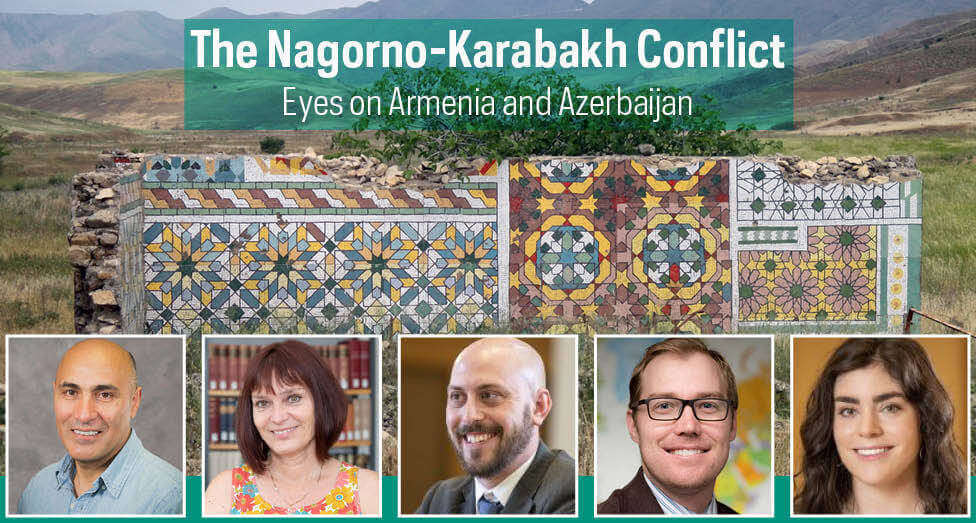
“We will illuminate dark places and, with a deep sense of responsibility, interpret these troubled times.”
—Joseph Pulitzer III (1913-1993)
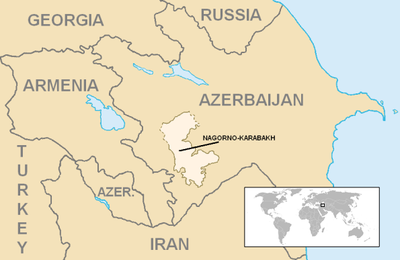
Home to more than 50 different ethnic groups, the Caucasus is considered the crossroads between Europe and Asia. Two countries of the region, Armenia and Azerbaijan, have sporadically fought over the territory of Nagorno-Karabakh since the collapse of the Soviet Union thirty years ago. Nagorno-Karabakh is internationally recognized as part of Azerbaijan, however, Armenia controls territories surrounding the region. The BBC estimated that one million people were displaced and 30,000 killed during the last major conflict between 1988 and 1994. With the tremendous escalation of violence in the region over the last month, are Armenia and Azerbaijan at the brink of another long cycle of violence? Will they be able to deescalate tensions and resume meaningful negotiations? How will the United Nations or other countries play a role in a diplomatic solution? Join the Nanovic Institute for European Studies as they host a discussion on the conflict and potential paths forward with academic experts.
Tuesday, November 10 at 12:45 - 1:45 p.m. ET
(A Zoom link will be emailed to you after registration is complete.)
Panelists
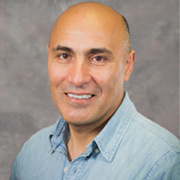
Ali Askerov
Associate Professor and Director of Graduate Study
Department of Peace and Conflict Studies
University of North Carolina at Greensboro (UNCG)
Ali Askerov, a noted scholar from Azerbaijan, has written extensively on the Nagorno-Karabakh conflict and, more broadly, on ethnic conflict, terrorism, mediation, peace education, conflict transformation, refugee issues, and structural violence. He is an author or co-author of several books that include Contemporary Relations Between Turkey and Russia: From Crisis to Cooperation (2018), Transformative Change: An Introduction to Peace and Conflict Studies (2015), Historical Dictionary of Chechen Conflict (2015), and Chechens From Past to Future: Healing the Wounds (2012).
Askerov is a research fellow of the Center for New North Carolinians. He has been interviewed for various television networks on international conflicts, terrorism, and national security issues.
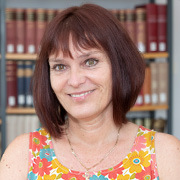
Jasmine Dum-Tragut
Associate Professor, Department of Biblical Studies and Ecclesiastic History
Head of the Center for the Study of the Christian East (ZECO) at Faculty of Catholic Theology
University of Salzburg
Jasmine Dum-Tragut is a docent of General Linguistics and Armenian studies at the Department of Linguistics, University of Salzburg; Head of the Department for Armenian Studies, Centre for the Research of the Christian East, University of Salzburg and senior researcher at the Department for Biblical Studies and Church History, University of Salzburg. She has taught Armenian Studies in Austria, Germany, U.S., and Israel. She has published more than 60 papers and 11 monographs referring to Armenian Studies and General Linguistics, and she has organized several Armenological conferences and has given more than 100 Armenological lectures in many countries.
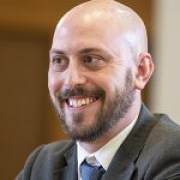
Samuel Morris
Masters Candidate, Sustainable Development, Class of 2021
Keough School of Global Affairs
University of Notre Dame
Samuel Morris served as a Peace Corps volunteer in rural Armenia, where he collaborated with local schools and non-governmental organizations to improve education and youth development programs. Prior to his Peace Corps service, he worked as an AmeriCorps volunteer coordinating environmental science education efforts between the Project WET Foundation and the Nature Conservancy in Phoenix, Arizona. Samuel also has interned at the United Nations, working with the NGO Committee on Disarmament, Peace, and Security. He holds a B.A. in political science and a minor in Persian from the University of Arizona. He is the recipient of a Paul D. Coverdell Fellowship.
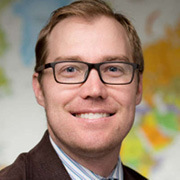
Paul Perrin
Director of Monitoring and Evaluation, Pulte Institute for Global Development
Associate Professor of the Practice, Keough School of Global Affairs
University of Notre Dame
Paul Perrin is the Director of Monitoring and Evaluation at the Pulte Institute for Global Development and associate professor of the practice in the Keough School of Global Affairs. Perrin’s work has spanned academic, government, and non-governmental settings and has largely focused on supporting the conceptualization, design, implementation, analysis, and reporting on monitoring and evaluation and implementation science activities in resource-challenged environments. Perrin has extensive experience in adult education and technical writing, including briefings for senior government officials, peer-reviewed publications, and technical reports.
Prior to joining the Pulte Institute, Perrin served as the director for monitoring, evaluation, accountability, and learning at Catholic Relief Services (CRS). He has also worked as senior technical advisor for health research and evaluation at CRS, and an information officer at the Office of U.S. Foreign Disaster Assistance within the U.S. Agency for International Development (USAID). During his tenure at USAID, Perrin served as editor-in-chief for two of the office’s annual reports, worked as information coordinator for the Haiti earthquake response management team, and provided information support to the Europe, Middle East, and Central Asia team.
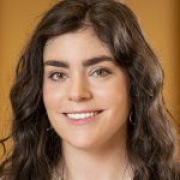
Rachael Rosenberg
Masters Candidate, International Peace Studies, Class of 2022
Keough School of Global Affairs
University of Notre Dame
Rachael Rosenberg served as a Peace Corps Volunteer in Georgia, where she developed the English education program at a school near the Georgian-Armenian border and led USAID-funded projects focusing on youth leadership, social activism, and gender equity. In 2017 Rachael spent a summer as a cultural ambassador for the USA Pavilion at the World Expo in Astana (now Nur-Sultan), Kazakhstan. She previously worked on research initiatives at the Kennan Institute and the U.S. Holocaust Memorial Museum in Washington, DC, and won a Critical Language Scholarship for intensive language study in Russia from the U.S. Department of State.
Originally from Texas, Rachael graduated summa cum laude from American University with a B.A. in international studies and Russian language and area studies. She speaks Russian, Georgian, and Armenian. At the Keough School, Rachael plans to explore the intersections of race/ethnicity, gender, and class in peacebuilding, as well as approaches to transitional and restorative justice in the aftermath of violent conflict. She is the recipient of a Kroc Institute Fellowship.
Photo Credit: Damaged mosaic at a bus stop circa 2014 via Wikimedia.